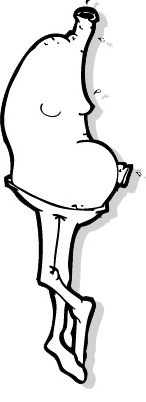Darwinism vs. Milkshakes
Tuesday, 26 June 2007 by kinakoJam

Backing up Maytel's recent post on the topic that we are (as societies) what we eat, so an article by Nicholas Wade in today's NY Times presents findings by scientists that we have also genetically evolved, partly according to what our ancestors have eaten.
"A category of genes under selective pressure covers those involved in metabolism, suggesting that people were responding to changes in diet, perhaps associated with the switch from hunting and gathering to agriculture."
"People have continued to evolve since leaving the ancestral homeland in northeastern Africa some 50,000 years ago, both through the random process known as genetic drift and through natural selection. The genome bears many fingerprints in places where natural selection has recently remolded the human clay, researchers have found, as people in the various continents adapted to new diseases, climates, diets and, perhaps, behavioral demands."
It seems that a historical bovine influence has given an unfair advantage to Northern Europeans and East Africans in the field of lime milkshakes.
"A notable instance of recent natural selection is the emergence of lactose tolerance — the ability to digest lactose in adulthood — among the cattle-herding people of northern Europe some 5,000 years ago. Lactase, the enzyme that digests the principal sugar of milk, is usually switched off after weaning. But because of the great nutritional benefit for cattle herders of being able to digest lactose in adulthood, a genetic change that keeps the lactase gene switched on spread through the population.
Lactose tolerance is not confined to Europeans. Last year, Sarah Tishkoff of the University of Maryland and colleagues tested 43 ethnic groups in East Africa and found three separate mutations, all different from the European one, that keep the lactase gene switched on in adulthood. One of the mutations, found in peoples of Kenya and Tanzania, may have arisen as recently as 3,000 years ago.
That lactose tolerance has evolved independently four times is an instance of convergent evolution. Natural selection has used the different mutations available in European and East African populations to make each develop lactose tolerance. In Africa, those who carried the mutation were able to leave 10 times more progeny, creating a strong selective advantage."
So there you have it. Crusts may not make your hair curly but milk & cookies might have a startling effect on your procreative powers. Well, at least after 7000 years or so.
C.R.E.A.M. get the Money:

However, a Harvard School of Public Health study reported in May that eating low fat yoghurt may actually decrease one's likelihood of conception.
"Recent research has shown that women who eat low-fat dairy products when trying to conceive may be dramatically cutting their chances of pregnancy. Drinking a pint of semi-skimmed or skimmed milk or eating two pots of yoghurt a day almost doubles the risk of anovulatory infertility, in which women stop ovulating."
Horror! And what's more, skim milk can give you zits, also decreasing your ability to procreate I'd say.
"Processing milk to make low-fat versions may raise levels of the hormones, making the situation worse.
The US researchers looked at the teenage diet of more than 47,000 women and then compared dairy product intake with cases of acne. Worst off were those who regularly drank skimmed milk, with two half-pint glasses a day raising the risk of the condition by 44 per cent. Those who drank a pint of whole milk a day were 12 per cent more likely to develop acne, while semi-skimmed milk increased the risk by 16 per cent. Cream and cottage cheeses also raised the risk of the condition, however, chips, chocolate and pizza did not."
Studies are still inconclusive on donuts, frikandel speziaal, pineapple fritters, Kyupi mayo and rhubarb cheesecake.

i eat low fat yoghurt and drink skim milk with my muesli....and my skin is unblemished...I therefore don't have any problems getting laid, but that's probably on account of the fact that I'm married
I haven't tested the fertility theory but I'll let you know when I get round to crossing that bridge